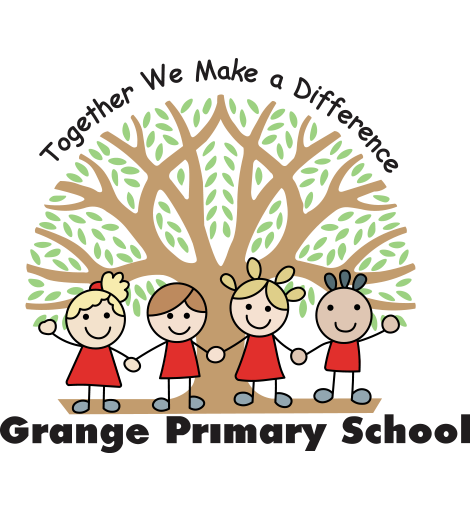Maths
Please find links to the following key documents at the bottom of this page:
- Whole School Progression Documents (Grange Primary School Maths Scheme)
- Calculations Policy
- Mathematical Vocabulary Progression
- Inclusion & Maths No Problem
- Special Educational Needs & Maths No Problem
Mathematics Curriculum Statement
Intent
At Grange Primary School, we strive to develop self-confident, independent learners who enjoy thinking deeply about mathematical concepts. We hold a deep-rooted belief that maths teaching should be inclusive for all through carefully supported teaching. We believe that children should be given the skills to understand the world around them by their ability to calculate, reason and problem solve. We aim to develop these skills through the ‘Concrete, Pictorial and Abstract’ approach. This approach enables all children to learn maths with a hands-on approach and allows them to make links to abstract concepts by having clear models to aid their understanding.
We aim for our children to:
Develop a positive attitude and approach to maths.
Provide the children with a learning environment that promotes discovery and risk-taking
Become life-long learners who become numerate adults
Implementation
We strongly believe that the mastery approach is the best way for our children to learn maths. We aim for our pupils to move through the content at the same pace. This depth of study allows our higher achievers opportunities to explore and make deep connections within and across topics. Maths No Problem describes this as ‘Differentiation through depth not acceleration’. It is also inclusive of all pupils and ensures that all pupils are exposed to age-appropriate teaching. In line with the ‘Concrete, Pictorial and Abstract’ approach that we deliver, children have constant access to a range of high-quality manipulatives. Having access to and deciding upon which manipulatives to use reinforces our intent to create independent learners who are confident to explore maths in a hands-on way. We have used the DFE-approved Maths No Problem scheme of work as a framework to build a bespoke learning experience that caters for the needs of the pupils in our community. This scheme is supplemented by other high-quality resources such as White Rose maths.
We ensure that children are given the opportunity to re-visit prior learning and build upon this quickly and efficiently.
We do this by:
- Using ‘Chapter Review’ low-stakes testing at the beginning of each unit allowing staff to pinpoint misconceptions.
- Follow the ‘Key Lesson’ support document which maps out key learning from prior year groups to their current topic.
- Formative assessment from each session is used to inform future planning and to address misconceptions
Our delivery of Maths No Problem follows a similar approach from Year 1 to Year 6. Having a clear, coherent, and consistent structure allows pupils to thrive as they move through school. Please see the Unit Overview guide on the school website. Although bespoke to us, the delivery of mathematics is based on ‘The Five Big Ideas’ published by the NCTEM, which are:
Coherence
Lessons are broken down into small, connected steps that gradually unfold the concept, providing access for all children and leading to a generalisation of the concept and the ability to apply the concept to a range of contexts.
Representation and Structure
Representations used in lessons are used to support the children in building up mathematical understanding and allowing them to apply their learning to a range of contexts and models. The overall aim is that children will eventually (when they are ready) use abstract ideas to solve their maths.
Mathematical Thinking
Children need to work hard to develop an understanding through reasoning, discussing with others, explaining their thinking and trying out new things.
Fluency
Quick and efficient recall of facts and procedures will ensure that children are not hindered by simple mathematical knowledge such as times tables and bonds of numbers.
Variation
Variation is twofold. It is firstly about how the teacher represents the concept being taught, often in more than one way, to draw attention to critical aspects, and to develop a deep and holistic understanding. It is also about the sequencing of the episodes, activities and exercises used within a lesson and follow-up practice, paying attention to what is kept the same and what changes, to connect the mathematics and drawing attention to mathematical relationships and structure.
Impact
Assessment is an integral part of delivering effective Maths teaching for all pupils. Assessment comes in many forms. However, we regularly use the following methods:
Summative Assessments
- Regular topic based low stakes assessments
- NFER Summative Assessment Tests - Years 1-5
- Identifying misconceptions through marking and planning to address misconceptions moving forward
- Key Learning Indicator Assessment completed by staff for each individual pupil
Formative Assessments
- Daily guided practice that is marked by the class teacher to identify misconceptions
- Class discussion and verbal feedback
- Use of concrete manipulatives to show understanding
These assessments are used to inform:
- Pupil Progress Meetings
- Subject Leader surgeries (termly)
- Reporting to parents
- Reporting to Governors
Children at Grange Primary School enjoy Maths. Lessons are inclusive of all pupils and we expect that our pupils are fluent in fundamental skills, able to reason mathematically and solve problems in a variety of ways. The impact of our current standards and the appropriateness of pitch and progression is measured through monitoring and feedback this includes:
- Learning walks
- Lesson observation and feedback
- Book looks
- Pupil voice conversations
- Peer review
- Team teaching
- Staff meeting training and discussion
- Half-termly data
- In house moderation
